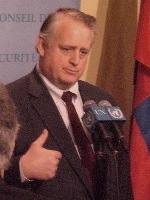International response to Darfur is ‘anemic’- US envoy
April 3, 2008 (UNITED NATIONS) — The U.S. envoy for Darfur increased the pressure on the United Nations and U.N. member countries on Thursday, saying the world’s response to the crisis in western Sudan had been “anemic.”

U.N. peacekeeping officials also complain of a lack of helicopters sorely needed to move troops around Darfur, a vast region roughly the size of France. Some diplomats say that neither Washington nor Russia has put enough pressure on China to influence Khartoum to stop trying to delay the deployment.
Richard Williamson, the U.S. presidential envoy for Darfur, made it clear that Washington is running out of patience. In addition to pushing Sudan, he is piling pressure on the United Nations and troop-contributing countries to deploy more soldiers as soon as possible — with or without helicopters.
“The international community’s response to the genocide in slow motion in Darfur has been anemic and these sorts of litanies of excuses are the reason,” Williamson told Reuters.
Washington has offered neither troops nor helicopters, but Williamson noted that the United States had committed a total of some $500 million to the Darfur peacekeeping effort.
He also said the United Nations had only spent a quarter of nearly $1.3 billion it had access to for its Darfur mission.
“That’s a lot of dough they could be spending to make some things happen,” he said.
About 2.5 million people have fled their homes during the five-year war in Darfur. International experts estimate some 200,000 have died in violence Washington calls genocide.
Khartoum denies genocide and puts the death toll at 9,000.
‘CRITICAL GAPS’
Last week Williamson wrote to U.N. Secretary-General Ban Ki-moon urging him to ensure that 3,600 more U.N.-African Union troops are deployed to Darfur by June, a target several diplomats at the U.N. told Reuters was unrealistic.
Williamson said that if those new troops were not in Darfur by June it would have nothing to do with a lack of hardware and everything to do with a lack of urgency.
“The reason you are not going to have those troops is not, I repeat, is not, because of helicopters. That’s a diversion.”
At the same time he acknowledged the helicopters were a problem, as were Khartoum’s delays in approving troops and other obstacles. But getting troops on the ground quickly to ease the suffering in Darfur was the top priority, he said.
“I don’t see how anyone can believe that that is not the first issue — how to bring relief to humanitarian suffering and move to stability on the ground,” he said.
Marie Okabe, a spokeswoman for Ban, told reporters that the United Nations welcomed the U.S. commitment, though she said soldiers for the U.N.-AU Darfur mission, known as UNAMID, must be properly equipped and trained before deploying.
She added that the lack of helicopters was one of the “critical gaps” that UNAMID urgently needed to fill.
Sudan’s Ambassador to the United Nations, Abdalmahmoud Abdalhaleem, told Reuters that Williamson had recently been to Khartoum where he met with the country’s top officials, including President Omar Hassan al-Bashir.
During these meetings, Williamson brought up U.S. concerns that Khartoum was dragging its feet, though Abdalhaleem denied that his country was doing anything other than fully cooperating with UNAMID and the U.N. Security Council.
(Reuters)
